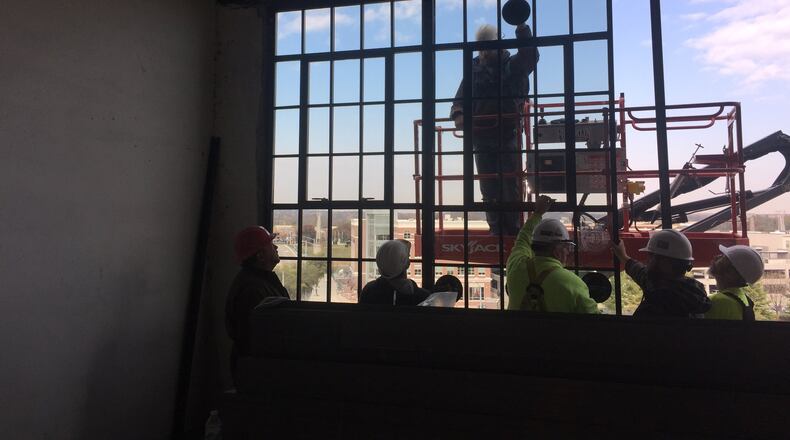The plan’s formula for urban revitalization seems to be working, officials said, as new housing downtown fills up rapidly, employers are expanding, more businesses are opening and the supply of recreation activities and cultural amenities is diversifying.
Some potentially game-changing projects loom on the horizon, include CareSource’s plans for a new office tower and the construction of a free music pavilion that could draw 100,000 attendees or more downtown each year.
“There’s so much going on in downtown Dayton, and it’s because of the perseverance, the vision and the belief in this room that our better days are ahead of us in the city of Dayton,” Dayton Mayor Nan Whaley said at the Special Improvement District (SID) annual meeting this week.
Since the launch of the Greater Downtown Dayton Plan in 2010, private and public sector organizations have invested $520.4 million downtown. That does not include the spending on the Interstate 75 upgrades, according to information presented at the Downtown Dayton Partnership’s SID meeting.
Charles Simms Development invested millions of dollars downtown to build 18 townhomes in 2011 and 31 more in the past couple of years, and the firm has three other townhome projects under construction or development.
Sinclair Community College last year opened its $5 million National UAS (Unmanned Aerial Systems) Training and Certification Center, where students and researchers work with cutting-edge drone technology.
“We’re making an incredible amount of progress downtown — we still have a lot of work to do, no doubt, but we continue to move forward,” said Sandy Gudorf, president of the Downtown Dayton Partnership, which is funded mainly through SID assessments.
In addition to those investments, about $530.1 million in projects currently are under development, according to the partnership.
It would be the Central Business District’s first new office tower since CareSource opened its $55 million corporate headquarters in late 2009/early 2010. The plan is for construction to finish in 2019.
“This will enable us to grow jobs in downtown Dayton,” said Dan McCabe, chief administrative officer with the nonprofit.
One of the most highly anticipated developments in the works downtown is the Levitt Pavilion Dayton.
The roughly $5 million outdoor amphitheater, planned for Dave Hall Plaza near Fifth and Main streets, is expected to open in 2018. The venue would host 50 free concerts each year and could draw as many as 2,500 visitors per show.
Supporters say the Levitt pavilion will become an anchor amenity that sparks redevelopment in the area, which is littered with empty and obsolete office buildings.
“It drives growth, revitalization and redevelopment — so all the things you see happening — this cultural addition is important for the entire community,” said Ellen Ireland, a member of the Friends of Levitt Pavilion Dayton Board of Directors.
Plans to revitalize the Dayton Arcade in phases received a big boost when the project was awarded $20 million in low income housing tax credits. The first phase of the $70 million, multi-stage project would create about 166 apartments, as well as commercial components.
“We’re hoping to be under construction and maybe open parts of it by the time Levitt starts hosting its first concert,” said David Williams, vice president of urban development with Miller-Valentine Group, which is a partner in the project.
Some of the big projects happening or planned for downtown continue to grow in size. Developers of the Water Street District — which consists of an office building and 215 apartments along the riverfront — plan to add 54 new apartments next spring.
Another development firm, the Ellway Group, has scooped up a variety of downtown properties along or near the 100 block of East Third Street. The firm envisions transforming the sleepy Fire Blocks District into housing, hospitality, retail and bar spaces.
Winfield Scott Gibson, managing partner with the Ellway Group, said his original $24 million redevelopment plan has evolved into a roughly $45 million plan and could grow much larger.
Other signs of improving conditions include an apartment vacancy rate of less than 3 percent and a 2015 survey of downtown businesses that found nine in 10 respondents believe the center city is headed in the right direction.
This year, 45 new businesses have committed to downtown by signing leases or opening their doors, said Scott Murphy, vice president of economic development with the Downtown Dayton Partnership.
That’s up from 32 new businesses during the same time frame in 2015.
More than 80 new businesses have moved downtown since 2015, and more than 110 startups have launched in the center city since 2011, the partnership said.
First-floor occupancy across downtown is up 15 percent, aided by 24 pop-up shops.
Closer look
This newspaper has reported on downtown’s recent growth and is committed to keeping you informed about future development.
About the Author

